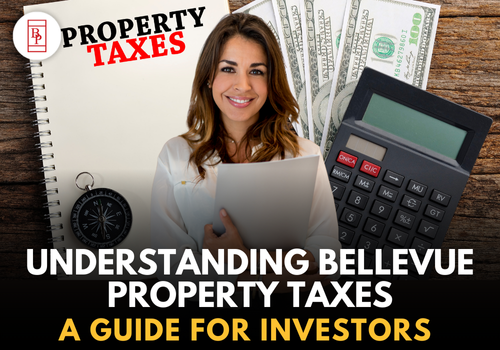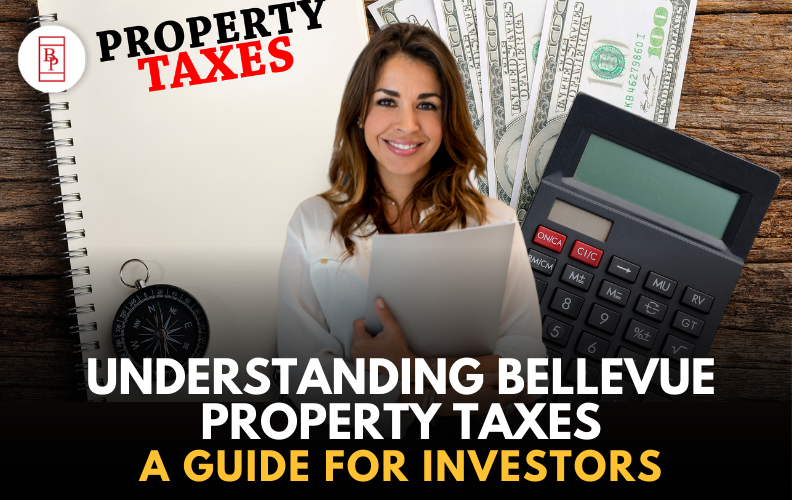Understanding Bellevue Property Taxes: A Guide for Investors

 Investing in real estate in Bellevue, Washington, is an exciting and potentially lucrative endeavor. As one of the most desirable cities in the Pacific Northwest, Bellevue offers a thriving economy, exceptional schools, and an enviable quality of life. However, before diving into the Bellevue Real Estate Market, investors need to understand one of the key cost components of property ownership—property taxes.
Investing in real estate in Bellevue, Washington, is an exciting and potentially lucrative endeavor. As one of the most desirable cities in the Pacific Northwest, Bellevue offers a thriving economy, exceptional schools, and an enviable quality of life. However, before diving into the Bellevue Real Estate Market, investors need to understand one of the key cost components of property ownership—property taxes.
This guide breaks down everything you need to know about property taxes in Bellevue, including how they’re calculated, what factors influence rates, and how savvy investors can plan accordingly. Whether you're buying a condo downtown, a luxury home in Somerset, or exploring Homes for Sale in Bothell WA, this article will help you make more informed investment decisions.
Why Bellevue Attracts Real Estate Investors
Before jumping into the tax details, let’s understand why Bellevue is such a magnet for real estate investors.
Located just across Lake Washington from Seattle, Bellevue has grown from a quiet suburb into a bustling urban center. It hosts major employers like Microsoft, T-Mobile, and Amazon, contributing to a strong job market and an influx of highly paid professionals. In turn, this growth fuels demand for housing.
Moreover, Bellevue boasts some of the top-ranked public schools in Washington, and its parks, recreational areas, and cultural events make it an attractive location for families and professionals alike.
With this backdrop, the Bellevue Real Estate Market remains competitive and strong, even during national slowdowns. Investors see the city as a long-term value play—making understanding property taxes all the more essential.
What Are Property Taxes?
Property taxes are annual taxes that property owners pay based on the assessed value of their real estate. In Bellevue, as in the rest of Washington state, property taxes are levied to fund local services such as public schools, police and fire departments, road maintenance, parks, and libraries.
Each property tax bill is composed of multiple levies approved by voters or set by law. These levies are distributed among various taxing districts—such as the city, county, school districts, and other special-purpose districts like hospitals or libraries.
How Property Taxes Are Calculated in Bellevue
In Washington state, property tax is based on the assessed value of the property as determined by the county assessor. In Bellevue, which falls under King County, the Assessor’s Office evaluates properties annually to determine their fair market value.
Here’s a simplified version of how property tax is calculated:
-
Assessed Value: This is the estimated market value of your property, determined annually.
-
Levy Rate: Each taxing district imposes a rate, usually expressed in dollars per $1,000 of assessed value.
-
Total Tax: Multiply your property's assessed value by the levy rate.
Example:
If your home in Bellevue is assessed at $1,000,000 and the combined levy rate is $9.50 per $1,000, your annual property tax would be:
$1,000,000 ÷ 1,000 × 9.50 = $9,500
Keep in mind that tax rates vary slightly by neighborhood due to differences in overlapping jurisdictions. For example, a home in the Bellevue School District may have different tax levies than one zoned for Lake Washington School District.
Current Property Tax Rates in Bellevue
Based on the latest information from King County, the typical total property tax rate in Bellevue is approximately between 0.9% and 1.1% of a property's assessed value. This is relatively moderate compared to other high-value markets across the country, especially when compared with cities in California or New York.
However, due to high property values, the actual dollar amount paid can still be significant. For instance, luxury homes in neighborhoods like Bridle Trails or Enatai may carry annual property taxes well above $20,000.
Key Factors That Influence Property Taxes in Bellevue
Several elements can cause your property tax bill to fluctuate over time:
1. Property Reassessments
King County reassesses properties every year. If your home’s market value has appreciated—likely in a rising Bellevue Real Estate Market—your assessed value and tax bill will increase accordingly.
2. Local Levy Increases
Voters may approve additional levies for schools, transportation, or public safety, which can lead to higher tax rates.
3. Improvements or Renovations
If you make significant upgrades—like finishing a basement or adding a second story—the property’s value could increase, raising your taxes.
4. Neighborhood Trends
Swift increases in property values within specific areas could lead to tax increases that are not in the same proportion as other areas. New developments, such as high-end condos or new homes in Bothell WA, can influence neighboring values and tax assessments.
Property Taxes and Investment Planning
Understanding the property tax structure is vital for investors, whether you’re flipping homes, building rental portfolios, or just entering the Bellevue Real Estate Market.
Here’s how taxes can affect your investment:
1. Cash Flow
For rental properties, property taxes are a recurring expense that directly affects monthly cash flow. Accurate tax estimates should be factored into your financial projections.
2. Return on Investment (ROI)
High property taxes can diminish your ROI, particularly in tight-margin scenarios. Compare tax rates across neighboring cities—sometimes investing just outside Bellevue, in areas like Bothell, may yield better numbers.
3. Long-Term Planning
If you're planning to hold onto property for several years, anticipate tax increases based on market trends and policy changes. A hot market generally leads to rising valuations—and higher taxes.
Tax Exemptions and Relief Programs
Washington State offers several property tax exemptions and deferral programs, particularly for senior citizens, veterans, and people with disabilities.
Some notable programs include:
-
Senior Citizen/Disabled Exemption: This program reduces or freezes property taxes for qualifying individuals.
-
Improvement Exemption: Temporary exemption on certain home improvements for remodeling.
-
Farm and Open Space: For qualifying land, a reduced assessment rate may apply.
Investors often overlook these benefits, but they can be powerful tools for specific scenarios—especially for investors working with aging clients or multigenerational households.
Strategies to Manage Property Taxes
Proactive planning can help investors manage and sometimes reduce the burden of property taxes:
1. Buy Strategically
Consider areas just outside Bellevue, like new homes in Bothell WA, where property values may be lower but appreciation potential is still strong.
2. Challenge the Assessment
If you believe your property has been overvalued, you can appeal the assessment through King County's Board of Equalization. Providing evidence like recent appraisals or comparable sales can sometimes result in a lower tax bill.
3. Work With Experts
Experienced Bellevue real estate agents can provide insights into neighborhood tax trends, help you find properties with manageable tax burdens, and connect you with tax professionals who specialize in real estate.
Property Taxes in Bothell vs. Bellevue
While this guide focuses on Bellevue, it's worth comparing with nearby Bothell—a city that’s rapidly gaining investor attention. Many new homes in Bothell WA are being developed to meet growing demand, particularly among tech workers priced out of Bellevue.
Bothell falls under both King and Snohomish Counties, depending on the location. Generally, Snohomish County has slightly lower property tax rates compared to King County. However, this difference can be offset by local levies or higher utility costs.
For investors looking for value and growth, Bothell represents a compelling alternative or complement to a Bellevue-centric portfolio.
The Role of Bellevue Real Estate Agents in Tax Planning
Partnering with experienced Bellevue real estate agents is not just about finding properties—they’re critical allies in navigating the tax landscape.
Good agents can:
-
Analyze tax implications of different properties
-
Help estimate future tax increases based on development plans or local levy proposals
-
Identify undervalued areas with lower assessments
-
Guide you through the appeals process if needed
Their local knowledge of the Bellevue Real Estate Market is invaluable when trying to build a tax-efficient investment strategy.
Final Thoughts
The Bellevue property tax system can seem complex, but with the right knowledge and support, investors can navigate it confidently. From understanding how taxes are calculated to taking advantage of exemptions and making strategic purchases, property taxes should be an integral part of any investment decision in Bellevue.
Whether you're exploring downtown condos, luxury estates, or new homes in Bothell WA, your ability to interpret and plan for taxes can mean the difference between a mediocre investment and a highly profitable one.
In this competitive and ever-changing Bellevue Real Estate Market, success favors those who do their homework—and that includes getting a firm grip on the property tax landscape.
Interested in learning more? Contact top-rated Bellevue real estate agents today to get expert guidance on your next investment, from tax planning to neighborhood insights.